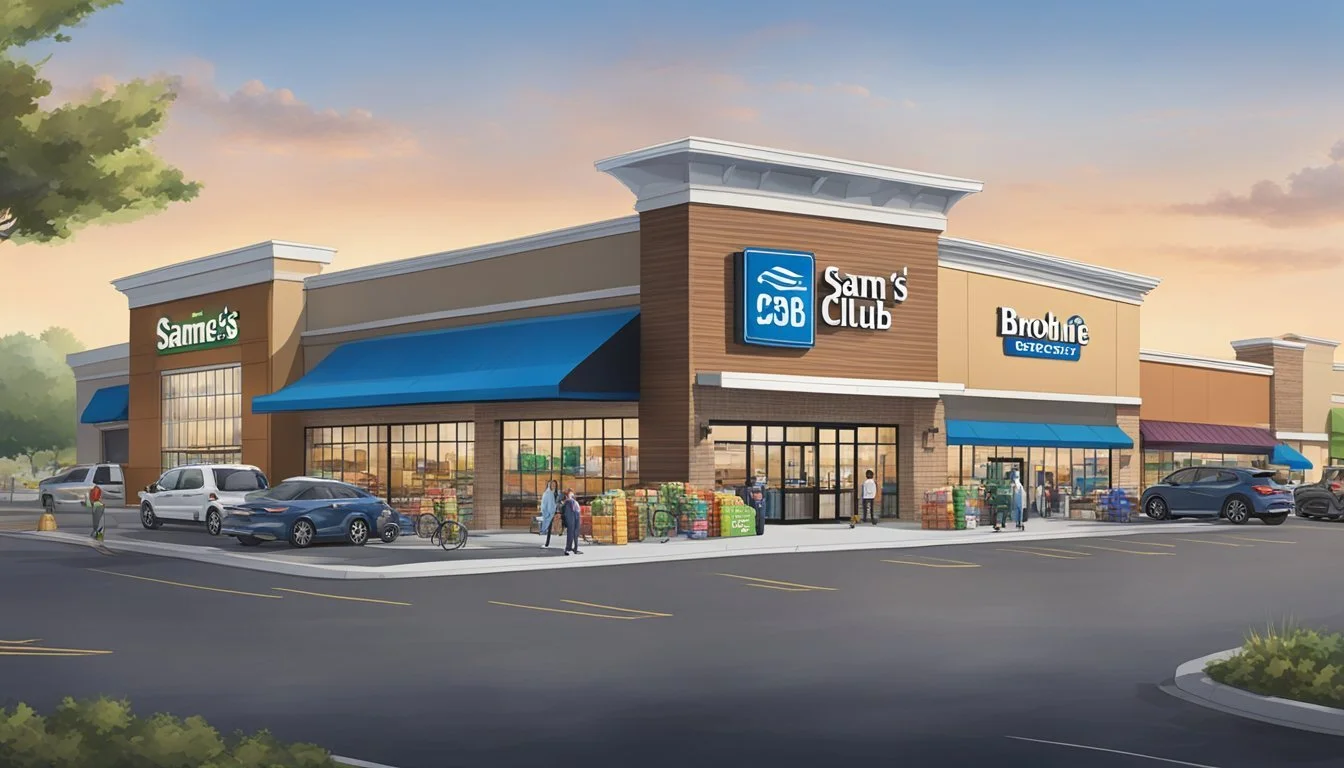Brookshire Grocery Company vs Sam's Club
A Comprehensive Comparison of Prices, Selection, and Service
Brookshire Grocery Company and Sam's Club are two well-known grocery retailers with distinct offerings and customer experiences. While Brookshire's operates over 180 stores across Texas, Arkansas, and Louisiana, Sam's Club is a nationwide membership-based warehouse club.
These two grocery chains cater to different shopping preferences and needs. Brookshire's tends to offer a more traditional grocery store experience with a focus on fresh produce and local products, while Sam's Club specializes in bulk purchases and discounted prices for members.
Each store has its own strengths and loyal customer base. Factors such as product selection, pricing, store atmosphere, and convenience play crucial roles in determining which option may be better suited for individual shoppers. Understanding the key differences between these two retailers can help consumers make informed decisions about where to shop for their grocery needs.
History and Background
Brookshire Grocery Company and Sam's Club have distinct origins and growth trajectories in the American retail landscape. Both companies have expanded from humble beginnings to become significant players in the grocery and wholesale sectors.
Brookshire Grocery Company Origins
Wood T. Brookshire founded Brookshire Grocery Company in 1928 with a small 25 x 100-foot store in Tyler, Texas. The company began as part of Brookshire Brothers, a chain started seven years earlier in Lufkin, Texas. In 1939, the companies split, with Wood T. Brookshire focusing on his own venture.
Brookshire Grocery Company remained family-owned and steadily expanded its presence in Texas and Louisiana. The company grew from a single store to over 200 locations, maintaining its commitment to customer service and community involvement.
Sam's Club Evolution
Sam's Club, a division of Walmart, was established in 1983 by Sam Walton. The first Sam's Club opened in Midwest City, Oklahoma, as a membership-based wholesale club. Walton aimed to provide small businesses with bulk purchases at competitive prices.
Sam's Club rapidly expanded across the United States, leveraging Walmart's existing infrastructure and supply chain. The company introduced innovative concepts like scan-and-go technology and online ordering. Today, Sam's Club operates hundreds of locations nationwide, offering a wide range of products to both businesses and individual consumers.
Store Profiles
Brookshire Grocery Company and Sam's Club operate distinct retail models catering to different consumer needs. Brookshire's focuses on traditional grocery formats with some specialty offerings, while Sam's Club emphasizes bulk purchasing for cost savings.
Brookshire's Store Format and Branding
Brookshire Grocery Company operates over 200 stores across multiple banners. Their flagship Brookshire's stores provide full-service grocery shopping experiences in communities throughout Texas, Louisiana, and Arkansas.
The company also runs Super 1 Foods locations, offering discount grocery options. For upscale shoppers, FRESH by Brookshire's provides gourmet and organic selections in a premium environment.
Spring Market stores serve smaller towns with essential grocery items. This diverse portfolio allows Brookshire's to meet varied consumer preferences and budgets across their operating region.
Sam's Club Bulk Retail Model
Sam's Club utilizes a warehouse-style format focused on bulk purchasing. Members gain access to a wide range of products at discounted prices by buying larger quantities.
The stores stock groceries, electronics, furniture, and more. Sam's Club's layout features wide aisles and pallet displays to accommodate bulk items and facilitate efficient shopping for both individual consumers and small businesses.
Membership tiers offer different benefits, such as early shopping hours or cash rewards on purchases. Sam's Club's model aims to provide significant savings for customers willing to buy in larger volumes, differentiating it from traditional supermarket formats.
Product Selection and Quality
Sam's Club and Brookshire Grocery Company offer distinct product selections and quality levels. Their offerings vary in terms of freshness, variety, and availability of specialty items.
Freshness and Variety of Produce
Sam's Club provides a wide range of produce in bulk quantities. Their fruits and vegetables are typically fresh and competitively priced. The selection includes both conventional and organic options.
Brookshire Grocery Company focuses on local and seasonal produce. They often partner with regional farmers to offer a diverse selection of fruits and vegetables. This approach ensures freshness and supports local agriculture.
Both stores maintain quality standards, but Brookshire's emphasis on local sourcing can result in produce that's picked and sold more quickly.
Meat and Deli Offerings
Sam's Club is known for its extensive meat department. They offer large cuts and bulk packages at competitive prices. Their selection includes premium cuts, grass-fed options, and specialty meats.
The deli section at Sam's Club provides pre-packaged meats and cheeses in larger quantities. They also offer rotisserie chickens and prepared meals.
Brookshire Grocery Company's meat department emphasizes quality over quantity. They often feature locally sourced meats and specialty cuts. Their deli offers a wider variety of prepared foods and made-to-order sandwiches.
Availability of Specialty Items
Sam's Club carries a range of specialty items, often in bulk sizes. These include international foods, gourmet cheeses, and high-end cooking ingredients. Their selection can vary by location and season.
Brookshire Grocery Company typically offers a more curated selection of specialty items. They focus on local and regional specialties, artisanal products, and unique finds. This approach provides customers with a more personalized shopping experience.
Both stores stock organic options, but Brookshire's tends to have a wider variety of natural and organic products throughout their store.
Pricing and Value
Sam's Club and Brookshire Grocery Company offer different pricing strategies and value propositions. Sam's Club emphasizes bulk purchases and member-exclusive deals, while Brookshire focuses on competitive everyday prices and local promotions.
Everyday Prices and Deals
Sam's Club generally offers lower prices on many items compared to traditional grocery stores. Their buying power as part of Walmart allows them to negotiate better deals with suppliers. Brookshire Grocery Company, being a regional chain, may have slightly higher everyday prices but often runs weekly specials and promotions to stay competitive.
Sam's Club features a "Shocking Values" section with limited-time deep discounts. Brookshire counters with "Red Hot Savings" on popular items. Both stores use digital coupons, but Brookshire tends to offer a wider variety for individual products.
Bulk Item Savings
Sam's Club excels in bulk purchasing options. Members can save significantly on large quantities of non-perishable goods, household items, and some fresh foods. A 30-fluid-ounce bottle of Olay Ultra Moisture Body Wash costs $8.97 at Sam's Club, often cheaper than at Walmart.
Brookshire offers some bulk options but focuses more on family-sized packaging rather than warehouse quantities. They provide "Buy One, Get One" deals on select items to increase value for shoppers.
Loyalty Programs and Discounts
Sam's Club requires a paid membership, starting at $45 annually for Club level. This grants access to all in-store and online savings. Their Plus membership ($100/year) offers 2% cash back on qualifying purchases, free shipping, and early shopping hours.
Brookshire's "Thank You Card" program is free to join. It provides personalized digital coupons, fuel discounts, and points that can be redeemed for groceries. Shoppers earn 1 point per dollar spent, with 500 points equaling $5 in grocery rewards.
Customer Experience and Services
Brookshire Grocery Company and Sam's Club offer distinct shopping experiences, with each prioritizing different aspects of customer service and store amenities. Both companies strive to meet shopper needs through various services and store environments.
Store Atmosphere and Cleanliness
Sam's Club provides a warehouse-style shopping experience with wide aisles and bulk product displays. The stores are typically well-organized, making it easy for customers to locate items. Concrete floors and high ceilings contribute to a no-frills atmosphere.
Brookshire Grocery Company stores offer a more traditional supermarket feel. They focus on creating a welcoming environment with brighter lighting and more varied decor. The company places emphasis on store cleanliness, regularly maintaining aisles and displays.
Both chains prioritize cleanliness, but Brookshire's smaller store format may allow for more frequent attention to detail in this area.
Pharmacy Services
Sam's Club pharmacies are known for competitive pricing on prescription medications. They offer immunizations, health screenings, and over-the-counter products. Members can access online prescription management and home delivery services.
Brookshire Grocery Company provides pharmacy services in many of its stores. They offer personalized care, medication counseling, and health screenings. Some locations feature drive-thru pharmacies for added convenience.
Both companies' pharmacists are available to answer questions and provide health advice, enhancing the overall customer experience.
Customer Service
Brookshire Grocery Company prides itself on personalized customer service. Employees are often local community members, fostering a friendly, small-town atmosphere. The company emphasizes courtesy and helpfulness as core values.
Sam's Club offers a membership-based model with dedicated customer service desks. Staff assist with returns, membership issues, and general inquiries. Self-checkout options are available for those preferring a quicker exit.
Both retailers provide online shopping options with pickup and delivery services, catering to customers who value convenience and time-saving solutions.
Community Involvement and Impact
Brookshire Grocery Company and Sam's Club both engage in community initiatives and sustainability efforts. Their approaches differ in scale and focus, reflecting their distinct business models and local presence.
Local Community Support
Brookshire Grocery Company prioritizes local impact through targeted donations and volunteer efforts. They support hunger relief, education, health, and family wellbeing initiatives in their operating areas. The company invests significantly in organizations that assist first responders, military personnel, and veterans.
Sam's Club, as part of Walmart Inc., participates in broader nationwide programs. They focus on food security, disaster relief, and workforce development. Sam's Club often leverages its extensive network to mobilize resources quickly during crises.
Both retailers encourage employee volunteerism, but Brookshire's approach tends to be more localized and personal.
Sustainability Initiatives
Brookshire Grocery Company implements sustainability measures at the store level. They focus on energy-efficient lighting, refrigeration systems, and waste reduction programs. The company also promotes local sourcing to reduce transportation emissions.
Sam's Club benefits from Walmart's ambitious sustainability goals. They aim for zero waste, operate on renewable energy, and work to create a more sustainable product index. Sam's Club's bulk packaging model inherently reduces some packaging waste.
Both retailers have made commitments to responsible sourcing and ethical supply chains. However, Sam's Club's larger scale allows for more comprehensive sustainability programs across their operations.
Store Location and Accessibility
Brookshire Grocery Company and Sam's Club differ significantly in their store locations and accessibility. Both chains have unique approaches to serving customers in urban and rural areas.
Accessibility within City and Rural Areas
Brookshire Grocery Company primarily operates in East Texas, with stores in cities like Longview and Tyler. They also have locations in neighboring states, including Louisiana and Arkansas. Their focus on smaller cities and rural areas makes them accessible to customers in less populated regions.
Sam's Club, on the other hand, has a broader national presence. They typically locate in larger cities and suburban areas. In East Texas, Sam's Club has stores in major centers like Tyler and Longview. They also serve larger metropolitan areas such as Shreveport and Bossier City in Louisiana.
Ease of Parking and Store Navigation
Brookshire's stores often feature spacious parking lots, accommodating the needs of their rural and suburban customers. Their store layouts are generally straightforward, with wide aisles and clear signage.
Sam's Club locations are known for their expansive parking areas, designed to handle high customer volumes. Inside, the warehouse-style layout can be more challenging to navigate, especially for first-time visitors.
Both chains prioritize accessibility for disabled customers, with handicap parking spaces and in-store mobility aids available. Sam's Club's larger format may require more walking, while Brookshire's compact design can be easier for some shoppers to manage.
Conclusion
Brookshire Grocery Company and Sam's Club offer distinct shopping experiences for consumers. Brookshire's provides a traditional grocery store format with a focus on fresh produce and local products. Their stores are typically smaller and more community-oriented.
Sam's Club, as a warehouse club, offers bulk purchases and a wider range of non-grocery items. Members can access discounted prices on large quantities, making it appealing for families or businesses.
The choice between these retailers depends on individual needs and preferences. Shoppers seeking everyday groceries and a personalized experience may prefer Brookshire's. Those looking to buy in bulk or access a broader product selection might find Sam's Club more suitable.
Pricing strategies differ, with Sam's Club often providing lower per-unit costs for bulk items. Brookshire's may offer more frequent sales and promotions on regular-sized products.
Both companies have loyal customer bases and strive to provide quality products and services. Ultimately, the "better" option varies based on shopping habits, household size, and specific product requirements.







